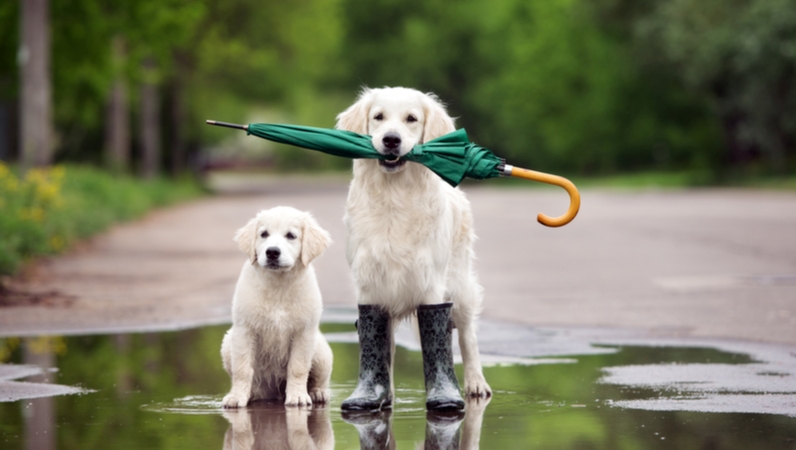Do dogs need shoes? The question may sound silly, but as it turns out, the answer is both yes and no. In some situations, shoes can be beneficial for dogs, while in others they're unnecessary or even harmful. Keep reading to discover when and why dogs need shoes, and when it's best to avoid them altogether.
What Are the Benefits of Shoes for Dogs?
In certain situations, shoes can help protect your dog's paws and provide extra comfort and support. Let's take a look at a few key benefits of shoes for dogs.
Protection Against the Elements
If you live in an area with hot summers or cold winters, then your dog may be more comfortable wearing shoes. Insulated shoes or booties can keep your dog's paws warm in the winter and protect against weather conditions like rain, snow, and ice. They can also prevent exposure to harmful substances such as road salt and antifreeze.
In summer, shoes can help keep your dog's paws cool and prevent them from getting burned on pavement, sand, or other hot surfaces. These types of shoes are made from lightweight, breathable, and durable materials that provide protection and allow your dog's paws to breathe.
Prevention of Injuries
Shoes can help protect dogs' paws from injuries caused by sharp rocks, thorns, and other hazards in the environment. They can also provide extra protection against burns, cuts, and other injuries. This makes them a good option for dogs that spend a lot of time outdoors.
If you often go hiking with your dog, consider investing in a pair of high-quality shoes or boots. This will help keep your dog's paws safe from injuries and will also prevent them from getting muddy or wet.
Mobility Assistance
Shoes and booties can provide support and comfort for dogs with mobility issues. Non-slip orthopedic booties are especially helpful for preventing falls and improving balance. These types of shoes are good for dogs with arthritis, hip dysplasia, or other conditions that make it hard for them to move around – especially on slippery surfaces.
If your dog has mobility issues, it's a good idea to talk to your veterinarian about whether shoes or booties are a good option for them. In some cases, they may be able to recommend a specific type of shoe that can help your dog stay safe and comfortable.
When Are Shoes Unnecessary?
Although shoes offer several benefits, there are also times when they're not necessary or even harmful. Let's take a look at some situations where it's best to avoid shoes for dogs.
If Your Dog Doesn't Need Them
Shoes may be beneficial in some cases, but they're not a necessity. If you live somewhere with relatively mild weather and your dog doesn't spend much time outdoors, then shoes aren't necessary for them. Instead of buying expensive shoes that only get worn occasionally, it's better to invest in other accessories that will provide more benefits for your dog.
If Your Dog Has Trouble Adapting to Shoes
Dogs can be picky when it comes to shoes and other accessories, so make sure you give your pup plenty of opportunities to get used to them before they start wearing them regularly. In some cases, dogs will have trouble adapting to shoes and may try to remove them or chew on them. If this is the case, it's best to avoid using shoes until your dog is comfortable with them.
If the Shoes Are Uncomfortable or Ill-Fitting
Uncomfortable, ill-fitting shoes can actually cause more harm than good. They may interfere with your dog's mobility and make it harder for them to move around naturally, which can lead to slips and falls. Ill-fitting shoes can also cause blisters, sores, and other painful injuries, just as they can for humans.
Tips for Choosing the Right Dog Shoes
If you've decided that your dog could benefit from wearing shoes, it's important to choose the right pair. Here are a few tips to help you select the best shoes for your pup:
- Measure your dog's paws before buying shoes and purchase the correct size for them. If you have a puppy or young dog, remember that they may outgrow their shoes quickly.
- Decide what type of environment your dog will be wearing the shoes in. If they'll primarily be used for walking on pavement or grass, you'll need a different type of shoe than if they'll be hiking or playing in the snow.
- Make sure the shoes are made from comfortable, durable, and lightweight materials. It's worth paying a little extra for a high-quality pair of dog shoes that will last.
- Ensure the shoes are adjustable so they'll fit securely on your dog's paws. If they're not adjustable, it may be difficult to keep them secure during use.
- Look for waterproof shoes or booties that will keep your dog's paws clean and dry in wet weather.
- Choose a pair of shoes with non-slip soles to help prevent falls and other accidents while walking on slippery surfaces.
Final Words
As you can see, there are many cases where shoes for dogs can be beneficial. But there are also times when they're not necessary. If you're unsure whether or not your dog needs shoes, it's always a good idea to talk to your veterinarian. They can help you decide if shoes are the right option for your dog and may be able to recommend a specific type that will be most beneficial.
Take some of the stress out of pet ownership with Accident & Illness Coverage from AKC Pet Insurance (underwritten by Independence American Insurance Company). Our pet insurance plans are designed to be there when you need them, allowing you to focus more on the health of your pet and less on costly veterinary bills. Click here for a quote today!


